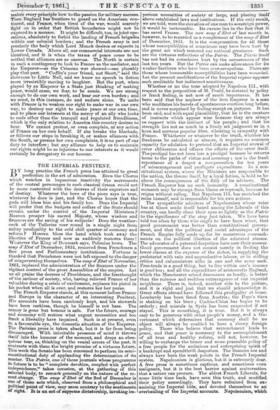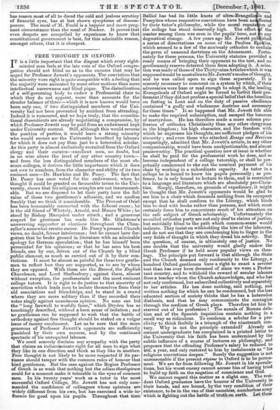THE IMPERIAL PENITENT.
BY long practice the French press has attained to great perfection in the art of admiration. Even the Chorus which watches in loquacious inactivity the movements of the central personages in each classical drama could not be more contented with the decrees of their superiors and of destiny. Whatever the hero of the piece says is true, whatever he does is just, and the Chorus hopes that the gods will bless him and his family too. Does the Imperial will prefer that the budgets and coffers of the State should gods will bless him and his family too. Does the Imperial will prefer that the budgets and coffers of the State should remain, under the control of the Imperial Ministers ? Heaven prosper his sacred Majesty, whose wisdom and firmness are the saving of his subjects! Does the weather- cock of the Tuileries veer round in a single night from sultry prodigality to the cold chill quarter of economy and reform ? Heaven bless the hand which took away the liberties of France and now as suddenly restores them ! Whatever the King of Denmark says, Polonius bows. The coup d'_Etat of December, 1851, removed from Frenchmen a free press and Parliamentary institutions. Fortune is thanked that Frenchmen were not left exposed to the danger of misgoverning themselves. The coup d'Etat of November, 1861, replaced the administration of the finances under the vigilant control of the great Assemblies of the empire. Let us all praise the decrees of Providence, and the forethought of the saviour of society, who, having relieved France of her valuables during a crisis of excitement, replaces his pistol in his pocket when all is over, and restores her her purse. The French Emperor stands, at this moment before France And Europe in the character of an interesting Penitent. His accounts have been carelessly kept, and his stewards have been reckless, though he himself is not base. The money is gone but honour is safe. For the future, courage and economy will restore what urgent necessities and too frank a liberality have impaired. Such is at present, even to a favourable eye, the domestic situation of the Emperor. The Parisian press is taken aback, but it is far from being discouraged. With inimitable presence of mind it throws itself into the humour of the moment, and drops an obse- quious tear, as, thinking on the venial errors of the past, it contrasts with them the bright promise of a virtuous future. This week the Senate has been convened to perform its semi- constitutional duty of applauding the determination of its master. The Petrie, one of those journals whose programme in future is to be " complete devotion, coupled with perfect independence," takes occasion, at the gathering of this salaried body, to remark generally on the nature of the re- cent change. The coup d'Etat of the 2nd of December is one of those acts which, observed from a philosophical and political point of view, may seem contrary to the sentiments of right. it is an act of supreme dictatorship, invoking im- perious necessities of society at large, and placing itself above established laws and institutions. if the only result, we are told, were the elevation of one man to sovereign power, it would be inexcusable. Its excuse lies in the fact that it has saved France. The new coup d'Etat of last mouth is, however, to be regarded as a complement of the coup d'Etat of December, 1851. It is the compensation for all those whose susceptibilities of conscience may have been hurt by the great act which restored our national greatness. Such are the virtuous reflections of the Patrth. The Pirtrie itself has not had its conscience hurt by the occurrences of the last ten years. But the Patrie can make allowances for its weaker brethren who have been over-scrupulous. There are those whose honourable susceptibilities have been wounded. Let the present modifications of the Imperial regime appease such creditable but indiscreet sensitiveuess.
Whether or no the tone adopted by Napoleon III., with respect to the proposition of M. Fould, be dictated by policy or frank feeling, is not now of much importance. It has been said that the nephew of the iron Emperor is a man who meditates his bursts of spontaneous emotion long before, and is never surprised by feeling except on purpose. It has been said, and with equal plausibility, that he is the creature of instincts which appear wise because they are always en rapport with the instinct of his people ; and that his strength lies not so much in a firmly set judgment as in a keen and nervous popular fibre, vibrating in sympathy with France. Whichever or whatever be the truth, whether his frankness be calculated or sincere, it requires no common capacity for adulation to pretend that an Imperial avowal of error obliterates and effaces the effects of the error itself. The prodigal has not been less a prodigal because he returns home to the paths of virtue and economy ; nor is the frank repentance of a despot a compensation for ten years of mismanagement and profligate expenditure. Iii a con- stitutional system, where the Ministers are responsible to the nation, the throne itself, by a loyal fiction, is held to be above the consequences of the folly of its advisers. The French Emperor has no such immunity. A constitutional monarch may be exempt from blame or reproach, because he reigns without ruling. But Napoleon III. has snatched the reins himself, and is responsible for his own actions. The sympathetic admirers of Napoleonism whose voice has at times made itself heard among the Liberals of this country, can hardly close their eyes so lightly as the Patric to the significance of the step just taken. We have been told too often by those who ought to have been wiser, that good government was better than constitutional govern- ment, and that the political and social advantages of the French Empire fully made up for its monstrous encroach- ments on the political liberties of the educated classes. The advocates of a paternal despotism have now their answer. Good government does not consist merely in feeding the lower classes at the expense of the richer, in supplying the proletariat with vain and unproductive labour, or in stifling critics and calumniators alike in one and the same sack.
Free-trade is a good thing, but to live within one's income is good too; and all the expenditure of aristocratic England, which the Manchester school denounces so loudly, is better than the ruinous and reckless extravagance of our imperial neighbour. There is, indeed, another side to the picture, and it is right and just that we should acknowledge it. Great effects abroad have followed this prodigality at home. Lombardy has been freed from Austria ; the Pope's tiara is shaking on his brow ; Cochin-China has begun to be orderly ; and misrule in Syria has been suspended if not stayed. This is something, it is true. But it is always easy to be generous with other people's money, and a Go- vernment which determines that economy shall be no object will always be enabled to have a showy foreign policy. Those who believe that retrenchment leads to peace, and that peace is necessary to the accomplishment of all true and healthy reform, will not, however, be willing to exchange the tamer and more peaceable policy of a free people for the audacious and enterprising spirit of a bankrupt and spendthrift despotism. The finances are and always have been the weak points in the French Imperial system. Napoleonism is glorious, but it is extremely dear. A free press is sometimes captious, and sometimes even malignant, but it is the best barrier against malversation that a nation can procure. The ablest French Liberals, for some little time back, have seen this truth, and modified their policy accordingly. They have refrained from ex- amining the Imperial title, and devoted themselves to an overhauling of the Imperial accounts. Napoleonism, which has reason moat of all to dread the cold and jealous scrutiny of financial eyes, has at last shown symptoms of discom- posure. The recal of M. Fould is a happier and more preg- nant circumstance than the recal of Necker. It proves that even despots are compelled by experience to know that constitutional government is best, for this admirable reason, amongst others, that it is cheapest.































 Previous page
Previous page